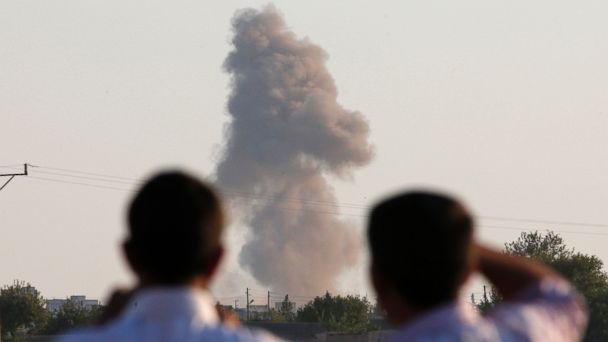US Ramps Up Airstrikes on ISIS in Kobani

(Lefteris Pitarakis/AP Photo)
U.S. warplanes have ramped up the number of airstrikes against ISIS fighters in the besieged city of Kobani, launching 21 airstrikes since Monday, officials said today.
It is the highest number of strikes since the start of the air campaign in Syria and is an indicator of how important the U.S. now sees the battle for Kobani.
"Indications are that airstrikes have slowed [ISIS] advances," said a statement from U.S. Central Command. "However, the security situation on the ground there remains fluid, with ISIL attempting to gain territory and Kurdish militia continuing to hold out."
ISIL is an alternative name for the Islamic extremist group.
Airstrikes Hit Jihadi Targets in Syria ISIS fighters have succeeded in taking over a third of the strategic city that lies on the border with Turkey. Centcom's statement said the U.S. "airstrikes are designed to interdict ISIL reinforcements and resupply and prevent ISIL from massing combat power on the Kurdish held portions of Kobani."
Centcom says the escalated number of airstrikes on Monday and today by U.S. and Saudi aircraft destroyed multiple ISIS staging locations, compounds, mortar positions, occupied buildings and vehicles near Kobani.
An estimated 200,000 residents from the surrounding were able to flee into Turkey before Turkish authorities closed the border crossing at Kobani.
Over the past week U.S. and coalition warplanes conducted 50 airstrikes in one week around Kobani to push back the ISIS advance.
The U.S. airstrike campaign in Syria has been criticized by rebel groups who say they have not stopped the ISIS advance on Kobani and have emboldened the Assad regime to launch attacks on them.
Pentagon spokesman Col. Steve Warren said today that the increased strikes in Kobani have certainly had a degrading effect" on ISIS forces in that city.
He also urged patience in judging the overall effectiveness of the airstrike campaign inside Iraq and Syria saying "to judge the success or failure after only several weeks of what will be months and possibly years it's simply too premature."
Ultimately, Warren said the future of the operation in Kobani should be seen as part of a broader fight where there will be battlefield successes and setbacks.
"They've lost Mosul Dam, they've lost Amerli, they've lost Sinjar while simultaneously they've gained ground in Anbar (Province)" said Warren. " We've been very clear about this this is the nature of warfare, this is the nature of battle. There'll be ebbs and flows across the battlefield for months."
Warren said Iraqi security forces are facing a "tough fight" against ISIS forces in Anbar Province who he said have "relative freedom of movement".
The spokesman said the airstrike operations in Iraq and Syria have so far cost $424 million since they began on Aug. 8 inside Iraq.